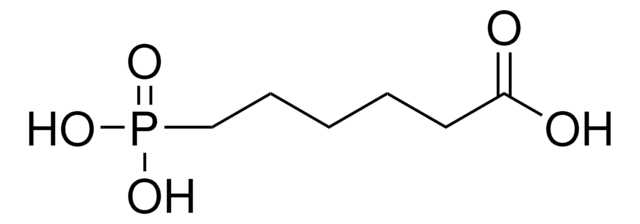About This Item
Recommended Products
assay
97%
form
solid
mp
181-187 °C
SMILES string
OP(O)(=O)CCCCCCCCCCCCP(O)(O)=O
InChI
1S/C12H28O6P2/c13-19(14,15)11-9-7-5-3-1-2-4-6-8-10-12-20(16,17)18/h1-12H2,(H2,13,14,15)(H2,16,17,18)
InChI key
BEPFDRNIALBIKQ-UHFFFAOYSA-N
Looking for similar products? Visit Product Comparison Guide
General description
Application
Storage Class
11 - Combustible Solids
wgk_germany
WGK 3
flash_point_f
Not applicable
flash_point_c
Not applicable
Certificates of Analysis (COA)
Search for Certificates of Analysis (COA) by entering the products Lot/Batch Number. Lot and Batch Numbers can be found on a product’s label following the words ‘Lot’ or ‘Batch’.
Already Own This Product?
Find documentation for the products that you have recently purchased in the Document Library.
Articles
Thin, lightweight, and flexible electronic devices meet widespread demand for scalable, portable, and robust technology.
Recent research highlights tunable properties of inorganic nanoparticles, driving interest in optoelectronics.
Self-assembled monolayers (SAMs) have diverse applications; article compares benefits of alkylthiolates on gold SAM systems.
Our team of scientists has experience in all areas of research including Life Science, Material Science, Chemical Synthesis, Chromatography, Analytical and many others.
Contact Technical Service








